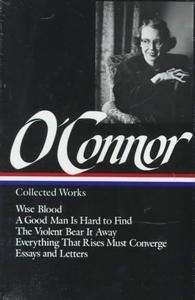Flannery O'Connor Collected Works

Editorial Library Of America
Fecha de edición septiembre 1988
Idioma inglés
EAN 9780940450370
1300 páginas
Libro
encuadernado en tapa dura con sobrecubierta
Resumen del libro
In her short lifetime, Flannery O'Connor became one of the most distinctive American writers of the twentieth century. By birth a native of Georgia and a Roman Catholic, O'Connor depicts, in all its comic and horrendous incongruity, the limits of worldly wisdom and the mysteries of divine grace in the Christ-haunted Protestant South. This Library of America collection, the most comprehensive ever published, contains all of her novels and short-story collections, as well as nine other stories, eight of her most important essays, and a selection of 259 witty, spirited, and revealing letters, twenty-one published here for the first time.
Her fiction brilliantly explores the human obsession with seemingly banal things. It might be a new hat or clean hogs or, for Hazel Motes, hero of Wise Blood (1952), an automobile. Nobody with a good car needs to be justified, Hazel assures himself while using its hood for a pulpit to preach his Church Without Christ. As in O'Connor's subsequent work, the characters in this novel are driven to violence, even murder, and their strong vernacular endows them with the discomforting reality of next-door neighbors. In order to recognize a freak, she remarks in one of her essays, you have to have a conception of the whole man.
In the title story of her first, dazzling collection of stories, A Good Man Is Hard to Find (1955), the old grandmother discovers the comic irrelevance of good manners when she and her family meet up with the sinister Misfit, who claims there is no pleasure but meanness. The terror of urban dislocation in The Artificial Nigger, the bizarre baptism in The River, or one-legged Hulga Hopewell's encounter with a Bible salesman in Good Country People these startling events give readers the uneasy sense of mysteries about to be revealed.
Her second novel, The Violent Bear It Away (1960), casts the shadow of the Old Testament across a landscape of backwoods shacks, modern towns, and empty highways. Caught between the prophetic fury of his great-uncle and the unrelenting rationalism of his uncle, fourteen-year-old Francis Tarwater undergoes a terrifying trial of faith when he is commanded to baptize his idiot cousin.
The nine stories in Everything That Rises Must Converge (1965) show O'Connor's powers at their height. The title story is a terrifying, heart-rending drama of familial and racial misunderstanding. Revelation and The Enduring Chill probe further into conflicts between parental figures and recalcitrant offspring, where as much tension is generated from quiet conversation as from the physical violence of gangsters and fanatics.
Biografía del autor
Flannery O'Connor (1925-1964) nació en el seno de una familia católica en Savannah, Georgia, en el denominado cinturón bíblico , de mayoría protestante, entorno en el que vivió casi toda su vida. Con dieciséis años perdió a su padre de lupus erithematosus, la misma enfermedad degenerativa que ella padeció de adulta. Estudió en el Georgia State College, donde comenzó a pintar y escribir sus primeros relatos. En 1946 se matriculó en un programa de escritura creativa en la Universidad de Iowa. En 1947 consiguió un Master of Fine Arts con una serie de relatos, entre ellos El geranio . Tras una agitada estancia en Nueva York, se trasladó a Connecticut con sus amigos Robert y Sally Fitzgerald, donde escribió su primera novela, Wise Blood. En 1950, al aparecer los primeros síntomas de su enfermedad, se instaló en una antigua finca agrícola de la familia con su madre, donde transcurrirá el resto de su vida, a excepción de algunas estancias en el hospital y un viaje a Europa en 1958, con escala en Lourdes, de donde volvió con una patente mejoría. En la casa familiar, llamada Andalusia , tuvo una dedicación casi exclusiva a la literatura, escribiendo numerosos relatos cortos y la novela The Violent Bear it Away. Encuentro ha publicados cuatro libros con varios de sus relatos más significativos y algunos ensayos, además de su Diario de oración (2018). El más reciente es la antología El negro artificial y otros escritos (2019).








